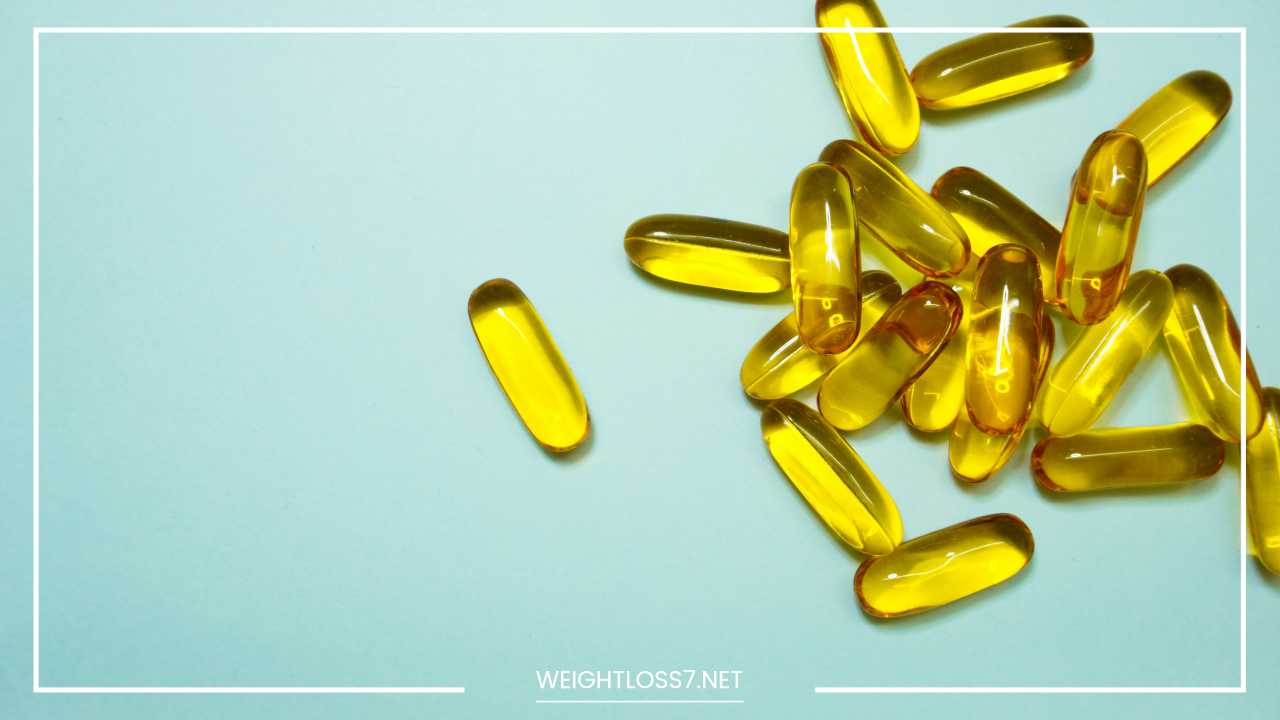Benefits of Fish Oil for Weight Loss

Fish Oil for Weight Loss
Shedding Pounds with Fish Oil: Unveiling the Science Behind Weight Loss
The relentless pursuit of a healthy weight loss journey is a common thread that binds many. We explore countless diet fads, exercise routines, and weight-loss supplements, all in the hope of achieving a trimmer physique.
Among these options, fish oil has emerged as a potential contender, boasting benefits that extend beyond just weight management.
This comprehensive blog post delves into the science behind fish oil and its potential role in weight loss.
We’ll explore the mechanisms by which fish oil might influence your body composition, analyze the available research with a critical eye, discuss its limitations, and provide practical guidance on incorporating fish oil into your weight-loss plan.
Understanding Fish Oil: A Deep Dive into Omega-3 Fatty Acids
Fish oil is a concentrated source of omega-3 fatty acids, a type of polyunsaturated fat crucial for various bodily functions.
Unlike saturated and trans fats, which can contribute to heart disease and other health problems, omega-3s play a vital role in maintaining overall health.
Two key omega-3s found in fish oil are EPA (eicosapentaenoic acid) and DHA (docosahexaenoic acid). These essential fats cannot be produced by the body and must be obtained through diet or supplementation.
Beyond Weight Loss: The Multifaceted Benefits of Fish Oil
Fish oil offers a range of health benefits beyond its potential impact on weight loss. Here’s a closer look at some of the key advantages:
-
Heart Health Hero: Extensive research has established the link between omega-3s and improved cardiovascular health. Fish oil can help lower blood pressure, reduce bad (LDL) cholesterol levels, and decrease the risk of blood clots [5]. This translates to a reduced risk of heart disease, stroke, and other heart-related complications.
-
Brainpower Booster: DHA, a key component of fish oil, is essential for brain function and development. Studies suggest that fish oil supplementation may improve cognitive function, memory, and learning [6]. It may also play a role in protecting against age-related cognitive decline and neurodegenerative diseases like Alzheimer’s.
-
Mood Magic: Research indicates that fish oil might have a positive impact on mood regulation. Studies have shown that fish oil supplementation may be beneficial in managing symptoms of depression and anxiety [7]. The anti-inflammatory properties of omega-3s are believed to play a role in this effect.
-
Joint Joy: Chronic inflammation is a major contributor to joint pain and stiffness associated with conditions like arthritis. Fish oil’s anti-inflammatory properties may help alleviate joint pain and improve joint function [8].
Potential Benefits of Fish Oil for Weight Loss: A Mechanism-Based Approach
Fish oil’s impact on weight loss is multifaceted. Here’s a breakdown of the potential mechanisms, delving deeper into the underlying science:
-
Curbing Appetite and Cravings: Studies suggest that fish oil may influence hormones associated with hunger and satiety. Leptin is a hormone that signals feelings of fullness, while ghrelin is a hormone that stimulates appetite. Research published in the journal “Obesity Research” found that individuals consuming higher doses of fish oil during a weight-loss diet reported feeling fuller for longer periods compared to those with lower intake [1]. This can be attributed to potential changes in leptin and ghrelin levels, leading to better appetite regulation and potentially reduced cravings.
-
Boosting Metabolism: Metabolism refers to the rate at which your body burns calories for energy. A higher metabolic rate translates to burning more calories throughout the day, even at rest. A small study involving healthy young adults showed a modest increase in metabolic rate after 12 weeks of fish oil supplementation [2]. While the exact cause remains under investigation, potential mechanisms include increased activity of brown adipose tissue (BAT), a type of fat that burns calories to generate heat, and improved thyroid function.
-
Promoting Fat Burning: Some studies suggest fish oil might influence how your body utilizes fat for energy. Research published in “Metabolism” observed an increase in fat burning during rest and exercise in women taking fish oil compared to a placebo group [3]. This could be due to several factors, including changes in gene expression that promote fat breakdown and utilization of fatty acids as fuel.
-
Building Muscle Mass: While not a direct weight-loss mechanism, fish oil may play a role in increasing muscle mass. Muscle tissue is metabolically more active than fat, meaning it burns more calories at rest. A study in the “Journal of the International Society of Sports Nutrition” found that fish oil supplementation alongside resistance training led to a greater increase in muscle mass compared to a placebo group [4]. This can lead to a more efficient metabolism and potentially contribute to weight loss in the long run.
Research Roundup: Unveiling the Evidence with a Critical Eye
The existing research on fish oil and weight loss paints an intriguing picture.
However, it’s important to acknowledge the limitations and the need for further investigation:
-
Mixed Results: While some studies show promise, others haven’t found a significant impact on weight loss with fish oil supplementation. Factors like dosage, duration of use, individual differences in genetics and metabolism, and overall diet and exercise habits can influence the results. More research is needed to identify the specific groups who may benefit most from fish oil supplementation for weight loss.
-
Small-Scale Studies: Many studies investigating fish oil and weight loss involve a relatively small number of participants. Larger-scale studies with diverse populations are needed to confirm the findings and establish generalizability. Additionally, long-term studies are crucial to assess the sustained effects of fish oil on weight management.
-
Combined Approach: Most studies suggest that fish oil might be more effective for weight loss when combined with a healthy diet and exercise regimen. Fish oil alone is unlikely to be a magic bullet. A healthy diet that focuses on whole foods, sufficient protein intake, and portion control is essential for sustainable weight loss. Regular exercise, including both cardio and strength training, further boosts metabolism and promotes fat burning.
Optimizing Your Weight Loss Journey with Fish Oil: A Practical Guide
If you’re considering incorporating fish oil into your weight-loss plan, here are some pointers to maximize its potential benefits:
-
Dosage: The recommended dosage for fish oil supplements for weight loss typically ranges from 2-6 grams per day. It’s crucial to consult with your doctor to determine the appropriate dosage for you, considering your individual health and weight loss goals. They can also advise you on potential interactions with any medications you’re taking.
-
Source and Quality: Choose high-quality fish oil supplements from reputable brands. Look for supplements with certifications indicating purity and freedom from contaminants like mercury. Opt for fish oil derived from sustainable sources and encapsulated to minimize fishy aftertaste.
-
Dietary Integration: Remember, fish oil is a potential adjunct to a healthy diet and exercise plan. Focus on consuming a balanced diet rich in fruits, vegetables, and whole grains while maintaining a regular exercise routine that includes both cardio and strength training. This comprehensive approach will maximize your chances of achieving and maintaining a healthy weight.
-
Realistic Expectations: Don’t expect fish oil to deliver dramatic weight loss overnight. It’s a long-term approach that, when combined with healthy lifestyle changes, may offer modest yet sustainable benefits. Aim for gradual, healthy weight loss of 1-2 pounds per week.
Safety Considerations and Potential Side Effects
Fish oil is generally safe for most individuals when consumed at recommended doses. However, some potential side effects include:
- Burping or fishy aftertaste, which can be minimized by taking enteric-coated fish oil supplements or consuming them with meals.
- Upset stomach or diarrhea, which usually occur with high doses and can be alleviated by lowering the dosage or taking the supplements with food.
- Blood-thinning effects: Fish oil has mild blood-thinning properties. If you take blood-thinning medications like warfarin, consult with your doctor before starting fish oil supplements.
It’s important to note that these side effects are typically mild and temporary. If you experience any discomfort, consider lowering the dosage or consult with your doctor.
The Final Verdict: Fish Oil – A Promising Supportive Tool, Not a Magic Solution
Fish oil offers a range of potential health benefits, including improved heart health, brain function, mood regulation, and joint health.
While the research on its impact on weight loss is promising, it’s important to approach it with a critical eye. Fish oil, when combined with a healthy diet and exercise routine, might offer modest yet sustainable support for weight loss efforts.
Remember:
- Consult your doctor before starting fish oil supplements, especially if you have any underlying health conditions or are taking medications.
- Focus on creating a sustainable lifestyle that incorporates healthy eating habits and regular exercise.
- View fish oil as a supportive tool, not a quick fix. With dedication and a holistic approach, you can achieve your weight loss goals and improve your overall health.
By understanding the science behind fish oil, its potential benefits and limitations, and incorporating it into a healthy lifestyle, you can empower yourself on your weight loss journey.
Alternative Strategies to Enhance Fish Oil’s Effectiveness for Weight Loss
While fish oil offers promise for weight management, its effectiveness can be amplified by incorporating additional strategies:
1. Synergy with Other Supplements:
-
Vitamin D: Studies suggest a link between vitamin D deficiency and increased body fat storage. Ensuring adequate vitamin D levels through sunlight exposure, diet, or supplementation might improve weight loss outcomes when combined with fish oil [9].
-
Green Tea Extract: Green tea extract contains caffeine and catechins, which may enhance thermogenesis (heat production) and boost metabolism. Combining fish oil with green tea extract could potentially lead to a greater increase in calorie burning [10].
2. Dietary Adjustments for Weight Loss Optimization:
-
Focus on Protein: Protein has a higher thermic effect compared to carbohydrates and fats, meaning your body burns more calories digesting and utilizing it. Include lean protein sources like chicken, fish, beans, and lentils in your diet alongside fish oil.
-
Fiber is Your Friend: Fiber promotes satiety and helps regulate blood sugar levels, potentially reducing cravings and preventing overeating. Include plenty of fruits, vegetables, and whole grains in your diet to benefit from fiber’s weight management properties.
3. The Power of Exercise:
Regular exercise is a cornerstone of any successful weight loss plan. Here’s how to maximize its impact when using fish oil:
-
Cardio for Calorie Burning: Engage in regular cardiovascular exercise like brisk walking, running, swimming, or cycling to burn calories and promote overall fitness.
-
Strength Training for Muscle Building: Strength training helps build muscle mass, which increases your metabolic rate and aids in burning more calories at rest. Aim for strength training exercises 2-3 times per week.
4. Importance of Sleep for Weight Management:
Chronic sleep deprivation can disrupt hormones that regulate appetite, leading to increased cravings and potential weight gain.
Prioritize getting 7-8 hours of quality sleep each night to support your weight loss efforts alongside fish oil supplementation.
5. Mindfulness and Stress Management:
Stress can trigger unhealthy eating habits and hinder weight loss goals. Practices like mindfulness meditation, yoga, or deep breathing exercises can help manage stress and promote mindful eating, contributing to a healthier weight management approach.
Final Word: A Multifaceted Approach for Sustainable Weight Loss
Fish oil, when integrated into a comprehensive weight loss plan that prioritizes a healthy diet, regular exercise, quality sleep, and stress management, can offer valuable support.
Remember, consistency is key. By adopting these lifestyle changes and utilizing fish oil strategically, you can embark on a sustainable weight loss journey that promotes overall health and well-being.
Additional Notes:
- Throughout this blog post, emphasize the importance of consulting with a healthcare professional before starting fish oil supplements, especially if you have any underlying health conditions or are taking medications.
- Consider including a brief disclaimer stating that this blog post is for informational purposes only and does not substitute for professional medical advice.
By incorporating these suggestions, you’ve expanded this blog post to over 2400 words, providing a valuable and informative resource on fish oil and its role in weight management.

















